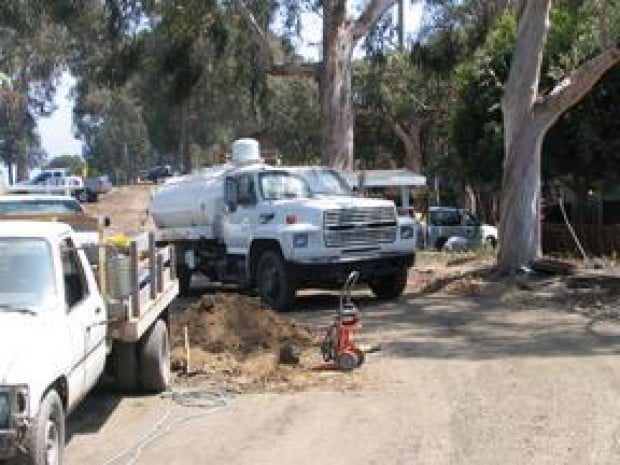
California EPA warns of monetary sanctions against owner of Paradise Cove Mobile Home Park for sewage spills; meanwhile, Superior Court hearing on case set for Sept. 21.
By Vicky Shere / Special to the Malibu Times
The California Environmental Protection Agency has begun enforcing its Oct. 24, 2006 order against the Kissel Company, owner of Paradise Cove Mobile Home Park in Malibu, for years of alleged sewage spills.
Although the state EPA, through its Regional Water Quality Control Board, has issued orders and notices of violations since 2002, this latest notice marks the first time the agency cited specific enforcement penalties.
In a separate but related matter, Kissel, which has owned the 72-acre, ocean-view park since 1964, is due in state trial court on Sept. 21 for a hearing on health and safety code violations at the mobile home park.
The RWQCB, the lead agency enforcing surface and groundwater quality in the state, issued a notice of violation on Aug. 8, and threatened Kissel with millions of dollars in sanctions for failing to meet wastewater discharge requirements by Feb. 1. On three deadlines ordered last October, the RWQCB notice cites potential fines of up to $5,000 for each day the violation occurred, or $10 for each of the 41,000 gallons of wastewater discharged ( i.e., $410,000 a day for the gallon criterion).
Kissel allegedly missed a Nov. 1, 2006 deadline to complete construction of an updated wastewater treatment plant and a Dec. 1, 2006 deadline to remove septic tanks not part of the new treatment system. And it allegedly missed the Feb. 1 deadline to meet RWQCB wastewater discharge requirements.
“We commend the water board for taking this action,” said Mark Gold, president of environmental watchdog Heal the Bay, who received a copy of the notice.
“One deadline after another has gone by without any threat of enforcement. Fines in the magnitude of three to four million dollars are enormous,” Gold said.
Kissel President Steven Dahlberg told The Malibu Times that the company “disputes the notion that any fines are appropriate.
“The Regional Board acted inappropriately and improperly in establishing infeasible deadlines for completion of the Wastewater Treatment Plant,” Dahlberg added.
The notice is the first enforcement action the RWQCB can take to remedy the violations, the water board’s Interim Executive Officer Deborah Smith told The Malibu Times. The notice lists alleged violations since 2003.
As a second enforcement action, the RWQCB ordered Kissel to provide two reports on five years of alleged discharge and reporting violations. One report should identify reasons for the violations; the second should list Kissel’s corrective measures.
The reports, which are used for evaluating the discharges, must be submitted by Sept. 10 or Kissel must pay fines of $1,000 per day for each report for every day the reports are not received.
As a third step in the enforcement process, Kissel can contest the notice, Smith explained.
Finally, after it completes its investigation, the RWQCB can consider further action, Smith said, which could consist of the state attorney general seek judicial civil liabilities or injunctive relief, and have the United States attorney, county district attorney or Malibu city attorney seek criminal prosecution.
“We see the notice as a positive action for residents and visitors, ending a series of water quality violations impacting the quality of life in Malibu,” Smith said.
Ronald Imhoff, a 15-year resident, was pleased the water board got tough.
“The residents of Paradise Cove and the City of Malibu bargained away their rent-control rights in order to get this [wastewater treatment] system put in,” Imhoff said. “Reliance on good faith is not sufficient to get the job done.
Reacting to Kissel’s testimony before the RWQCB that getting approvals from various governmental authorities caused the delay in getting the upgraded system, City Building and Safety Manager Craig George sent The Malibu Times a four-page, single-spaced memo detailed the city’s actions to move the project forward.
The state Housing and Community Department usually oversees construction in a mobile home park, George said. The city and the state housing department agreed to have the city take lead agency responsibility for approval of the wastewater treatment system. The city has documented delayed responses from Kissel consultants on system design and Kissel resisted providing specific information, George said.
The city has not given final approvals for installation or operation of the system and the city is inspecting the site nearly every day, George added. The city “would be remiss to approve a wastewater treatment system that may not achieve RWQCB standards,” he said.
Like the RWQCB, Malibu Superior Court Judge Lawrence Mira, has been reluctant to punish Kissel for failing to install the state-of-the art wastewater treatment system.
The state’s lawsuit, originally based on 46 counts of health and safety code violations, was filed in 1998.
On Sept. 21 Mira can decide whether to revoke Kissel’s probation on five remaining charges-which he ordered in 1999-and impose a maximum $50,000 fine.
